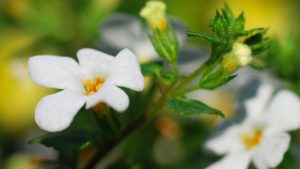Bacopa is an herb originally from India and a component of many ancient Ayurvedic formulations. Its use, dating back to 2,500 BC, includes a tonic formula to stimulate cognitive function and prolong longevity.
Numerous clinical studies have been conducted to evaluate bacopa’s benefits on brain health and cognitive function (1-8). Bacopa extracts have been clinically demonstrated to improve cognition, particularly speed of attention, in healthy individuals. Bacosides, key compounds present in bacopa, are being investigated for their neuroprotective effects and ability to modulate the brain neurotransmitters acetylcholine and serotonin (1, 7).
Nutritional Support for a Sharp Mind
Finding optimal nutritional support is a step in the right direction when it comes to preserving the brain health and memory of an aging population. Although several biomedical research groups are working on understanding brain function, designing a medicine for cognitive support has not yet been possible. Ancient practices have a different perspective and solution. For example, Indian Ayurvedic medicine has described alternative ways to combat mental fogginess and to slow down the brain’s aging process through a combination of herbs and energy balance.
An Ancient Nootropic Herb
Bacopa monnieri (L.) Wettst, is an ancient herb also known as thyme-leaved gratiola or brahmi (10, 11, 12). The plant is found in warm, marshy wetland areas, including India, East Asia, Australia, and the United States (11, 12, 13). Bacopa is a member of the plantain family, Plantaginaceae (4), a key ingredient in Ayurveda and Traditional Chinese Medicine (10, 12).
The ancient Ayurvedic books Caraka Samhita (2,500 B.C.), the Sushruta Samhita (2,300 B.C.) and the Indian Materia Medica, give account of bacopa’s many benefits as a tonic to support intellectual activity (10, 11). In modern scientific literature, bacopa is defined as a nootropic substance (11, 14, 15, 16, 17), from the Greek “nous” meaning “mind” and “trepein” meaning “to bend.” Nootropics improve cognitive function, particularly executive functions, memory, creativity, or motivation. This help protect the brain from chemical and physical assaults, and increases the efficacy of neuronal firing control mechanisms in cortical and sub-cortical regions of the brain.
Key Components Found in Bacopa
Researchers have found a unique chemical class of triterpenoid saponins, the bacosides, (16). Bacosides are unique to this plant’s genera and their content is used in the quality control of the herb (8). The physiological role that bacosides play in bacopa benefits is beginning to be understood (11, 16, 18). Bacoside A and bacoside B, steroidal compounds in nature, seem to be essential for the neuroprotective and neuromodulating effects of bacopa extracts (7).
Bacopa extract benefits are demonstrated in preclinical tests and clinical trials
Bacopa extracts have been reported to have many actions on in vitro and animal studies, protecting brain cells from oxidative stress and modulating the formation of essential brain chemicals (6, 16). Animals given bacopa extracts show benefits in motor learning, acquisition, retention, and delay extinction of newly acquired behaviors (16). Numerous clinical trials with bacopa have now been published (1-9).
Australia is the leading country on the clinical trials effort, conducting most recent randomized, double-blind, placebo-controlled studies under the supervision of Dr. Con Stough, director of the Swinburne Centre for Neuropsychology University in Melbourne and Director of the National Institute of Complementary Medicine (NICM) Collaborative Centre for the Study of Herbal and Natural Medicines for Neurocognition (2-6).
Australian clinical trials have shown bacopa benefits on human cognition and as a neuroprotective and memory enhancer (1-8). The combined results of these trials suggest bacopa works in complementary pathways in the brain providing an integral protection and neuromodulation, improving cognition (7). The mechanism of action of bacopa includes inhibition of free radicals responsible of causing harm to brain cells. It also works as both an inhibitor of acetylcholinesterase and as an activator of choline acetyltransferase, two key enzymes modulating brain’s activity (16, 18). The result is that the neurotransmitter acetylcholine is increased supporting a sharp memory and retention (16, 18).
Isagenix nutritional support with bacopa
Isagenix offers bacopa in both Ionix® Supreme and in IsaGenesis®, two key products providing optimal nutritional support to keep a healthy and active population with a sharp brain. These products provide different levels of bacopa extract aimed to help support your mental health.
References
- Stough C, Downey LA, Lloyd J, et al. Examining the nootropic effects of a special extract of Bacopa monniera [sic] on human cognitive functioning: 90 day double-blind placebo controlled randomized trial. Phytother Res. 2008;22:1629-1634.
- Benson S, Downey LA, Stough C, et al, An Acute, Double-Blind, Placebo-Controlled Cross-over Study of 320 mg and 640 mg Doses of Bacopa monnieri (CDRI 08) on Multitasking Stress Reactivity and Mood, Phytother Res. 2013; DOI: 10.1002/ptr.5029.
- Downey JK, Nemeh F, Lau A, et al, An Acute, Double-Blind, Placebo-controlled crossover study of 320 mg and 640 mg doses of a special extract of Bacopa monnieri (CDRI 08) on sustained cognitive performance, Phytother Res., 2013; 27: 1407–1413.
- Stough C, Lloyd J, Clarke J, et al. The chronic effects of an extract of Bacopa monniera (sic) (Brahmi) on cognitive function in healthy human subjects. Psychopharm, 2001; 156: 481–484.
- Stough CK, Pase MP, Cropley V, et al. A randomized controlled trial investigating the effect of Pycnogenol and Bacopa CDRI08 herbal medicines on cognitive, cardiovascular, and biochemical functioning in cognitively healthy elderly people: The Australian Research Council Longevity Intervention (ARCLI) study protocol (ANZCTR12611000487910). Nutr J, 2012; 11: 1–9.
- Morgan AM, Stevens J, Does Bacopa monnieri improve memory performance in older persons? Results of a randomized, placebo-controlled, double-blind trial, J Alternat Complement Med, 2010; 16: 753–759.
- Stough C, Scholey A, Cropley V, et al. Examining the cognitive effects of a special extract of Bacopa monniera (sic) (CDRI 08: KeenMind): A Review of Ten Years of Research at Swinburne University J Pharm Pharm Sci 2013;16(2): 254 – 258.
- Kongkeaw C, Dilokthornsakul P, Thanarangsarit P, Limpeanchob N, Scholfield CN. Metaanalysis of randomized controlled trials on cognitive effects of Bacopa monnieri J Ethnopharmacol. 2014;151(1):528-535.
- Kean JD, Downey, LA, Stough C. A systematic review of the Ayurvedic medicinal herb Bacopa monnieri in child and adolescent populations, Complem Ther Med, 2016;29:56-62.
- Nadkarni KM, Nadkarni AK. Dr. K. M. Nadkarni’s Indian materia medica: with ayurvedic, unani-tibbi, siddha, allopathic, homeopathic, naturopathic & home remedies, app. & indexes. 3 ed. Bombay, India: Popular Book Depot; Popular Prakashan; 1982.
- Nemetcheck MD, Stierle AA, Stierle DB, Lurie DI. The Ayurvedic plant Bacopa monnieri inhibits inflammatory pathways in the brain, 2017, Ethnopharmacol. 2017;197:92–100.
- Williamson E. Bacopa monnieri In: Major Herbs of Ayurveda. Churchill Livingstone; 2002, 321-325.
- Tropicos, The Missouri Botanical Garden databse, Accessed Mar 22, 2017 at: http://www.tropicos.org/Name/29202063
- Russo A, Borrelli F. Bacopa monniera [sic], a reputed nootropic plant: an overview. 2005;12:305-317.
- McPhee GM, Downey LA, Noble A, Stough C. Cognitive training and Bacopa monnieri: Evidence for a combined intervention to alleviate age associated cognitive decline. Med Hypotheses. 2016;95:71-76
- Aguiar S, Borowski T. Neuropharmacological review of the nootropic herb Bacopa monnieri. Rejuvenation Res 2013;16(4):313-326.
- Abascal K, Yarnell E. Bacopa for the brain: a smart addition to Western medicine. Altern Complement Ther. 2011;17(1):21-25.
The post Spotlight: Bacopa appeared first on Isagenix Health.
Source: IsagenixHealth.net





